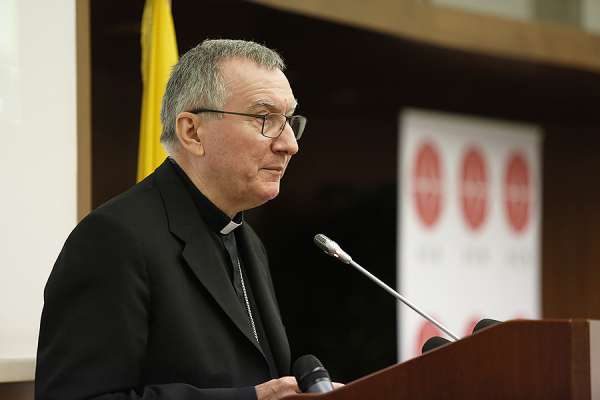Parolin under investigation: he knew the investments of the Vatican

A letter from Cardinal Pietro Parolin leaked to an Italian news agency shows that the Secretariat of State was aware, and approved to its highest degrees, of the dishonored purchase of a luxury real estate property in London now at the center of a Vatican survey.
The Italian daily Domani published on 10 January a "confidential and urgent" letter addressed by Cardinal Parolin, Vatican Secretary of State, to Jean-Baptiste de Franssu, president of the Institute for Religious Works (IOR) also known as the "Vatican bank ". "
In the letter, Cardinal Parolin asked the IOR to lend 150 million euros (about 182,3 million dollars) to the Vatican Secretariat of State. The Secretariat of State needed the money to pay off the loan from Cheney Capital four months earlier. The Secretariat of State took the loan to buy the shares in the London property.
Cardinal Parolin called the investment "valid", said the investment had to be safeguarded and asked the IOR for the loan. He also wrote that the loan was necessary because the financial situation at the time suggested to the Secretariat of State not to use its reserve to "hedge investments", but to "acquire additional liquidity".
The Secretary of State also specified that the loan would have a "two-year maturity" and that the IOR would be remunerated "in line with the international market" for the loan.
According to Domani, the IOR immediately moved to comply with the request and informed the Supervisory and Financial Intelligence Authority. ASIF has supervisory power over the IOR, but not over the Secretariat of State.
In April, ASIF defined the operation as “feasible”, considering that the IOR had sufficient funds to carry it out. At the same time, ASIF requested adequate due diligence to comply with the anti-money laundering laws in force.
In May, Dr. Gianfranco Mammì, director general of the IOR, asked Monsignor Edgar Peña, Substitute of the Secretariat of State, to transcribe the request in a letter signed by him. According to Mammì, the Substitute has "executive power" and for this reason the letter from Cardinal Parolin was not enough for the IOR to carry out the requested operation.
Monsignor Peña Parra accepted Mammì's requests and signed a letter on June 4 and another on June 19 to explain the loan request.
On June 27, the IOR experts gave the green light to the financial operation. On 29 June, the IOR presented the economic plan of the loan to the officials of the Secretariat of State.
But on 2 July Mammì changed his mind and told the Vatican prosecutor that Archbishop Peña Parra was not clear and would not reveal who would be the real beneficiary of the requested loan.
A Vatican source confirmed to CNA that Cardinal Parolin's letter is authentic and that the story written by the newspaper Domani is accurate.
After Mammì's complaint to the Public Prosecutor's Office, on 1 October 2019 the Vatican police searched and seized ASIF and the Secretariat of State.
Two days later, news came that the Vatican had suspended five officials: Msgr. Maurizio Carlino, Dr. Fabrizio Tirabassi, Dr. Vincenzo Mauriello and Mrs. Caterina Sansone of the Secretariat of State; and Mr. Tommaso Di Ruzza, ASIF Director.
Subsequently, the Vatican also suspended Msgr. Alberto Perlasca, who headed the administrative office of the Secretariat of State from 2009 to 2019.
Although no criminal charges have been filed against any of them, all of these officials, with the exception of Caterina Sansone, no longer work in the Vatican. Di Ruzza has not been renewed since the director of ASIF, Tirabassi and Mauriello, have agreed on early retirement and both Carlino and Perlasca have been sent to their dioceses of origin.
Although the leaked letter from Cardinal Parolin has no relevance to the investigation, it does provide important context.
One of these is that the Secretariat of State was aware of the existence of financial and ethical concerns regarding the 2011-2012 investment in the luxury real estate property at 60 Sloane Avenue in London, managed by 60 SA Company.
The Vatican Secretariat of State signed its purchase for $ 160 million with the Luxembourg fund Athena, owned and managed by the Italian financier Raffaele Mincione, who acted as an intermediary.
When the Athena fund was liquidated, the investment was not returned to the Holy See. The Holy See risked losing all the money if it didn't buy the building.
ASIF examined the deal and then proposed to restructure the investment, excluding intermediaries and thus saving the Holy See.
At that moment the Secretariat of State asked the IOR for sufficient resources to close the old mortgage and allow a new one to complete the purchase.
Since the investment was initially considered "good" by the IOR, it still remains a mystery what led Mammì to change his mind and report the financial operation to the public prosecutor; especially when in September 2020, the Apostolic See's Heritage Administration (APSA) reportedly paid the loan with Cheney Capital and took out a new loan to safeguard the investment. It was the same operation suggested by Cardinal Parolin's letter.
So why did the IOR not perform the operation as originally planned?
As more details of the operation come to light, the reason appears to be a power struggle in Pope Francis' inner circle, with no clear winner. Currently, one year and three months after the searches and seizures in the Secretariat of State, the Vatican investigations have not led to waivers but also to no decision not to proceed. Until the investigation leads to clear conclusions, the scenario will continue to be confusing as to where Vatican finances are heading.